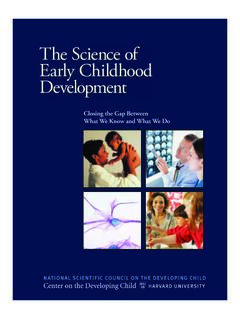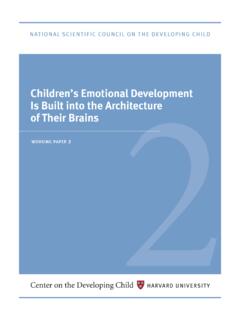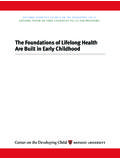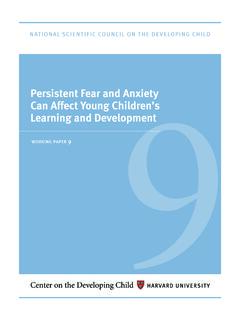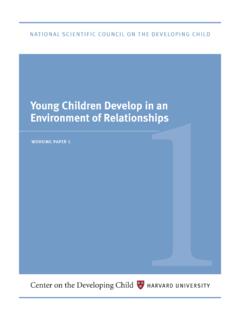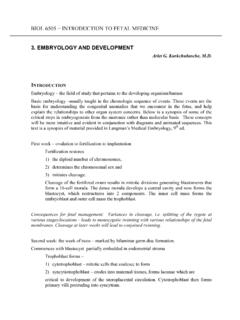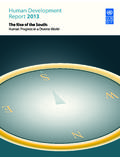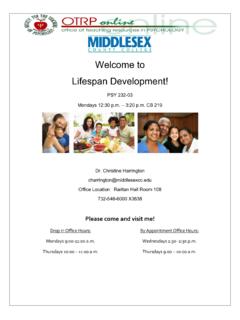Transcription of The Science of Early Childhood Development
1 The Science ofEarly Childhood DevelopmentClosing the Gap Between What We Know and What We DoCouncil MembersJack P. Shonkoff, , Chair Julius B. Richmond FAMRI Professor of Child Health and Development Director, Center on the developing Child, Harvard UniversityW. Thomas Boyce, Sunny Hill Health Centre/BC Leadership Chair in Child DevelopmentProfessor, Graduate Studies and Medicine, University of British Columbia, VancouverJudy Cameron, of Psychiatry, University of PittsburghSenior Scientist, Oregon National Primate Research CenterProfessor of Behavioral Neuroscience and Obstetrics & Gynecology, Oregon Health and Science UniversityGreg Duncan, Edwina S. Tarry Professor of human Development and Social Policy Faculty Fellow, Institute for Policy Research, Northwestern UniversityNathan A.
2 Fox, of human Development , University of Maryland College ParkWilliam Greenough, Swanlund Professor of Psychology, Psychiatry, and Cell and Developmental BiologyDirector, Center for Advanced Study at University of Illinois, Urbana-ChampaignMegan Gunnar, Regents Professor and Distinguished McKnight University Professor, Institute of Child Development , University of MinnesotaEric Knudsen, Edward C. and Amy H. Sewall Professor of Neurobiology, Stanford University School of MedicinePat Levitt, Professor of PharmacologyAnnette Schaffer Eskind Chair and Director, Kennedy Center for Research on human Development , Vanderbilt UniversityBetsy Lozoff, Professor of Pediatrics, University of Michigan Medical SchoolResearch Professor, Center for human Growth and Development , University of MichiganCharles A.
3 Nelson, Richard David Scott Chair in Pediatric Developmental Medicine Research, Children s Hospital BostonProfessor of Pediatrics, Harvard Medical SchoolDeborah Phillips, Professor of Psychology and Associated Faculty, Public Policy Institute Co-Director, Research Center on Children in the , Georgetown UniversityRoss Thompson, Professor of Psychology, University of California, DavisContributing MembersSusan Nall Bales President, FrameWorks InstituteJames J. Heckman, Henry Schultz Distinguished Service Professor of Economics, University of ChicagoBruce S. McEwen, E. Mirsky Professor Head, Harold and Margaret Milliken Hatch Laboratory of Neuroendocrinology, The Rockefeller UniversityArthur J. Rolnick, Senior Vice President and Director of Research, Federal Reserve Bank of MinneapolisCouncil PartnersThe FrameWorks InstituteThe Johnson & Johnson Pediatric InstituteThe National Conference of State LegislaturesCouncil SponsorsThe Buffett Early Childhood FundThe Pierre and Pamela Omidyar FundThe John D.
4 And Catherine T. MacArthur FoundationSuggested citation: The Science of Early Childhood Development . (2007) National Scientific Council on the developing Child. January 2007 naTIOnaL SCIEnTIFIC COunCIL On THE developing CHILDS econd Printing November 29/24/07 9:47:53 The future of any society depends on its ability to foster the health and well-being of the next generation. Stated simply, today s children will become tomorrow s citizens, workers, and par-ents. When we invest wisely in children and families, the next generation will pay that back through a lifetime of productivity and responsible citizenship. When we fail to provide chil-dren with what they need to build a strong foundation for healthy and productive lives, we put our future prosperity and security at risk.
5 Two recent developments have stimulated growing public discussion about the right balance between individual and shared responsibility for that strong foundation. The first is the explosion of research in neurobiology that clari-fies the extent to which the interaction between genetics and Early experience literally shapes brain architecture. The second is the increasingly recognized need for a highly skilled workforce and healthy adult population to confront the growing challenges of global economic competition and the rising costs of Social Security, Medicare, and Medicaid for the aging baby an effort to identify those aspects of Development that are accepted broad-ly by the scientific community, the National Scientific Council, based at the Center on the developing Child at Harvard University, brought together several of the nation s leading neuroscientists, developmental psychologists, pediatricians, and economists.
6 This document presents their critical review of the existing literatures in their fields and a consensus about what we now know about Development in the Early Childhood years. The objective of the Council is to move beyond the public s fascination with the latest study and focus on the cumulative knowledge of decades of re-search that has been subjected to rigorous and continuous peer review. The goal of this document is to help the public and its policy makers understand the core principles of that body of work that are now sufficiently accepted across the scientific community to warrant public is our hope and belief that better public understanding of the rapidly growing Science of Early Childhood and Early brain Development can provide a powerful impetus for the design and implementa-tion of policies and programs that could make a significant difference in the lives of all children.
7 With-out that understanding, investments that could generate significant returns for all of society stand the risk of being rejected or undermined. Thus, there is a compelling need for scientists to share with the public and its representatives an objective basis for choosing wisely among competing demands on lim-ited resources. This paper is designed to provide a framework within which this complex challenge can be addressed most effectively. Its goal is to promote an understanding of the basic Science of Early Childhood devel-opment, including its underlying neurobiology, to inform both public and private sector investment in young children and their families. To this end, the paper presents a set of core developmental concepts that have emerged from decades of rigorous research in neurobiology, developmental psychology, and the economics of human capital formation, and considers their implications for a range of issues in pol-icy and practice.
8 Core Concepts of Development Child Development is a foundation for community Development and economic Development , as capable children become the foundation of a prosperous and sustainable society. Brains are built over time. The interactive influences of genes and experience literally shape the architecture of the developing brain, and the active ingredient is the serve and return nature of children s engagement in relationships with their parents and other caregivers in their family or 19/24/07 9:47:55 AM Both brain architecture and developing abilities are built from the bottom up, with simple circuits and skills providing the scaffolding for more advanced circuits and skills over time. Toxic stress in Early Childhood is associated with persistent effects on the nervous system and stress hormone systems that can damage developing brain architecture and lead to lifelong problems in learning, behavior, and both physical and mental health.
9 Creating the right conditions for Early Childhood Development is likely to be more effective and less costly than addressing problems at a later age. Implications for Policy and Practice Policy initiatives that promote supportive relationships and rich learning opportunities for young children create a strong founda-tion for higher school achievement followed by greater productivity in the workplace and solid citizenship in the community. Substantial progress toward this goal can be achieved by assuring growth-promoting experiences both at home and in community-based settings, through a range of parent education, family support, Early care and education, preschool, and intervention services. When parents, informal community programs, and professionally staffed Early Childhood services pay attention to young children s emotional and social needs, as well as to their mastery of literacy and cognitive skills, they have maximum impact on the Development of sturdy brain architecture and preparation for success in school.
10 When basic health and Early Childhood programs monitor the de-velopment of all children, problems that require attention can be identified in a timely fashion and intervention can be provided. The basic principles of neuroscience and the technology of human skill formation indicate that later remediation for highly vulner-able children will produce less favorable outcomes and cost more than appropriate intervention at a younger age. The essence of quality in Early Childhood services is embodied in the expertise and skills of the staff and in their capacity to build positive relationships with young children. The striking shortage of well-trained personnel in the field today indicates that substantial investments in training, recruiting, com-pensating, and retaining a high quality workforce must be a top priority.
